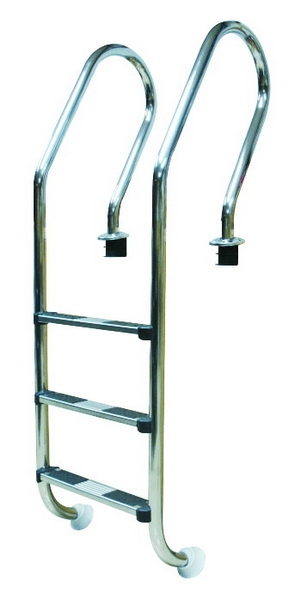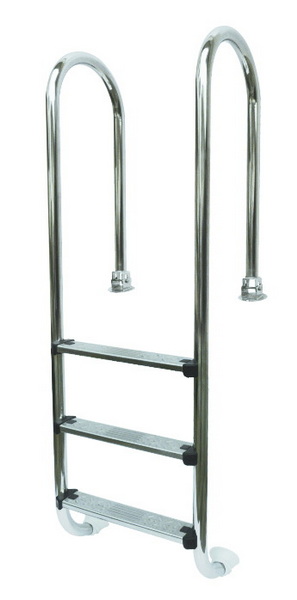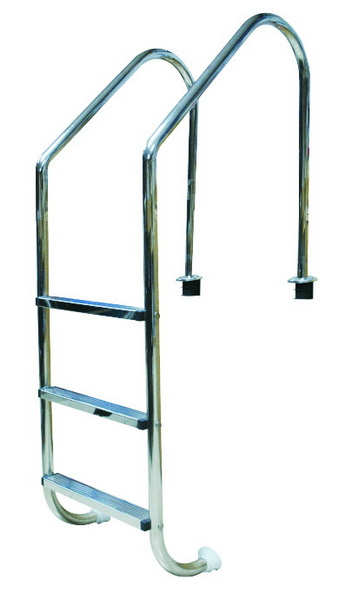Views: 222 Author: Tina Publish Time: 2025-10-17 Origin: Site








Content Menu
● Why Choose PVC for Pool Ladders?
● Step 1: Planning and Measurements
● Step 2: Cutting the PVC Pipes
● Step 3: Assembling the Ladder Frame
● Step 4: Adding Non-Slip Step Surfaces
● Step 5: Installing the Ladder
● Maintenance Tips for PVC Pool Ladders
● Frequently Asked Questions (FAQs)
>> 1. How durable are PVC pool ladders compared to metal ones?
>> 2. Can I paint a PVC pool ladder?
>> 3. What is the cost range for building a PVC pool ladder?
>> 4. How do I prevent the ladder from slipping in the pool?
>> 5. Is it safe to build a pool ladder myself?
Building a PVC pool ladder is a rewarding DIY project that enhances the safety and aesthetics of your swimming pool. Using durable PVC materials ensures longevity and resistance to pool chemicals. This guide will walk you through each step of constructing a high-quality PVC pool ladder suitable for most residential pools.

PVC (polyvinyl chloride) is:
- Lightweight yet strong
- Resistant to corrosion and chemicals
- Easy to cut, shape, and assemble
- Cost-effective and widely available
These properties make PVC perfect for pool ladders, especially when combined with smart manufacturing techniques like the ones used in our premium filtration and pool accessory production.
Before starting, gather the following materials and tools:
- PVC pipes (1.5 to 2 inches diameter for steps and rails)
- PVC elbows and T-joints
- PVC end caps
- PVC cement and primer
- Measuring tape
- Saw (PVC cutter or hacksaw)
- Drill with bits
- Sandpaper
- Marker
- Level
- Safety goggles and gloves
Measure the height and width of your pool deck where the ladder will be installed. A typical pool ladder:
- Extends about 3 feet above the pool deck
- Has four to five steps, spaced about 10-12 inches apart
- Ensures steps are wide enough (around 12 inches) for safe footing
Sketch your ladder plan with these dimensions.

Mark the PVC pipes according to your sketch:
- Two vertical pipes (rails) matching the ladder height
- Four to five horizontal pipes (steps) with widths equal to step length plus connectors
Using PVC elbows and T-joints, assemble the ladder frame:
- Attach elbows at the top of the vertical rails to form the ladder handles
- Connect T-joints at step positions along the rails
- Insert horizontal pipes into T-joints
Use PVC primer and cement at each joint for a strong, water-tight seal.
Attach non-slip tape or grip pads to each PVC step to prevent slipping. This is crucial for safety, especially when wet.
Alternatively, pool ladder step covers can be installed.
Position the ladder at the pool edge. Secure it by:
- Anchoring the base of the ladder with weighted PVC end caps or rubber feet
- Optionally bolting the top rails to pool decking if possible
- Regularly clean with mild soap and water to prevent algae buildup
- Inspect for cracks or loose parts periodically
- Reapply non-slip tape or replace grip pads as needed
Building a PVC pool ladder is a practical and cost-effective way to enhance your pool's safety and convenience. With durable materials and a simple step-by-step process, even beginners can create a sturdy ladder that lasts. Regular maintenance ensures it stays safe and attractive for years to come.
If you'd like professional-grade filtration and pool accessories produced with advanced manufacturing technology, our factory specializes in OEM services for global brands. Contact us to learn more about our premium sand filters, DE filters, cartridge filters, water pumps, LED lights, and accessory solutions.

PVC ladders resist corrosion and chemicals better, making them longer-lasting in pool environments, although they may be less heavy-duty under extreme loads.
Yes, but use specialized PVC paint for flexibility and adhesion. Proper surface prep is essential.
Typically between $50 to $150, depending on pipe quality and additional accessories.
Use rubber feet or pad anchors at the base and ensure secure installation on the deck.
With proper measurements, materials, and tools, building your own ladder is safe and can save money. Follow this guide closely and prioritize safety features.
This article introduces leading Pool Filter Valve Manufacturers and Suppliers in Japan and Asia, covering valve types, key Japanese pool brands, OEM opportunities, and application segments. It explains how advanced engineering, strict quality control, and strong visual marketing help exporters win global pool projects.
This article introduces the main types of Pool Filter Valve Manufacturers and Suppliers serving Russia, including local distributors, industrial filter producers, global brands, and Chinese OEM partners. It explains key selection criteria, product ranges, and OEM opportunities for Russian pool projects.<br />
This article introduces the leading Pool Filter Valve Manufacturers and Suppliers in Australia, explains common valve types and technical features, highlights major distributors and OEM opportunities, and offers practical tips for international buyers sourcing compatible filtration valves and systems.
This article introduces Italy’s leading Pool Filter Valve Manufacturers and Suppliers, detailing their technologies, materials, OEM services, and application scenarios. It explains how Italian valves integrate with sand, DE, and cartridge filters and why global brands choose Italian partners for premium pool filtration solutions.<br />
This article introduces the Portuguese market for pool filtration equipment and highlights how local specialists, European brands, and Chinese OEM Pool Filter Valve Manufacturers and Suppliers cooperate to serve residential and commercial pools, offering multiport valves, filters, pumps, and customized OEM solutions.<br />
This article explains whether you can safely use pool filter sand in an aquarium, covering sand types, preparation, pros and cons, plant and fish compatibility, maintenance tips, and alternatives. It helps hobbyists choose and manage substrate using pool-grade filtration media.
This article explains when to backwash a pool filter using pressure readings, water clarity and flow as guides. It covers sand and DE filter schedules, backwash steps, common mistakes, troubleshooting cloudy water, and how OEM sand filter systems can simplify maintenance for global pool owners.<br />
This article explains what pool filter balls are, how they work, and why they are an increasingly popular alternative to sand in residential pool filters. It covers benefits, installation, maintenance, compatibility, and OEM opportunities for brands seeking high‑performance filtration solutions.<br />
This article explains how often to change a pool filter cartridge, covering typical 1–3 year lifespans, signs of wear, and factors like usage, climate, and maintenance. It shows how cleaning frequency, pressure readings, and water clarity guide replacement and highlights the value of OEM cartridge solutions.
This article explains how often to change a pool filter cartridge, covering typical 1–3 year lifespans, factors that affect replacement timing, and clear signs of wear. It outlines cleaning versus replacement, residential vs commercial schedules, and highlights OEM cartridge solutions for complete pool filtration systems.<br />
Learn how to remove a stuck inground pool ladder step‑by‑step, from releasing anchor wedges and dissolving mineral buildup to using safe, controlled force and seasonal maintenance. Discover tools, safety tips, and prevention methods to protect your rails, anchors, and pool deck.<br />
This guide explains how to remove a corroded pool ladder step by step, from safety prep and penetrating oil to leverage, heat and cutting as a last resort. Learn how to clean and restore stainless steel, prevent future corrosion and decide when to replace the ladder for long‑term pool safety.<br />
Reinforce a pool ladder the right way with solid base leveling, secure deck anchors, safe weighting, better traction, and corrosion control. Learn practical DIY methods, maintenance tips, and safety standards to make above‑ground and in‑ground pool ladders sturdier and safer for every swimmer.<br /> <br />
This guide explains how to put up a pool ladder safely, covering ladder types, tools, and step‑by‑step installation for above‑ground and in‑ground pools. It also details stability tips, safety checks, maintenance advice, and multimedia ideas to help users install ladders with confidence.<br /> <br />
This in-depth guide shows how to put together a Vinyl Works pool ladder step by step, from sorting parts to final safety checks. It covers tools, ballast, handrails, mounting to pool or deck, gate installation, maintenance tips, and a clear FAQ to help owners assemble with confidence.<br />
Replacing a pool pump typically costs $300–$1,600, depending on pump type, size, and labor. Learn what affects pool pump replacement cost, the benefits of variable‑speed pumps, and how OEM pool equipment solutions help brands and distributors control price and quality.<br /> <br />
Learn how to wire a pool pump safely with the right voltage, breaker, wire size, GFCI protection, grounding, and bonding. Step‑by‑step guidance, testing tips, and FAQs help homeowners, installers, and OEM buyers ensure efficient, code‑compliant pool circulation systems.<br />
Learn how to replace a swimming pool pump motor step by step, from shutting off power and disassembling the pump to installing a new motor, wiring it safely, and testing for leaks. Ideal for DIY pool owners and OEM buyers seeking reliable filtration solutions.<br />
This in‑depth guide explains how to safely remove a motor from a pool pump, from shutting off power and draining the system to disconnecting wiring, separating the motor, and inspecting seals, while also highlighting OEM pool pump and filtration solutions for global brands.<br />
This article explains whether a pool pump must run all the time, how many hours per day are recommended, and how factors like filter type, climate, and variable speed pumps affect run schedules. It also highlights how a professional Chinese OEM factory supplies complete pump and filter solutions.<br />
